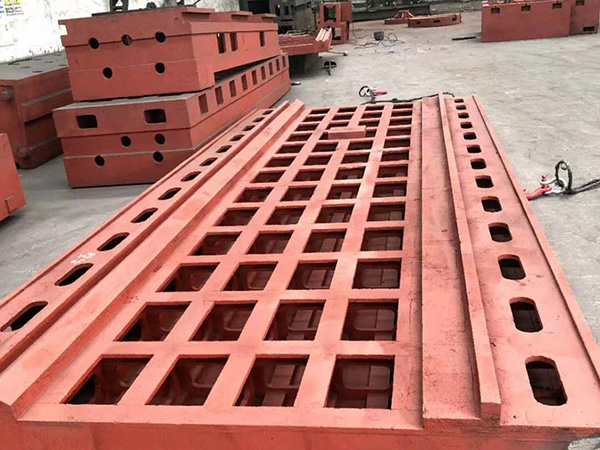- Navigation -
NEWS DETAILS
NEWS INFORMATION
How Heat Treatment Improves Machine Tool Castings
AUTHOR:Bozhong Tool DATE:2025-11-03 10:00:59 HITS:128
In precision engineering, the strength and stability of machine tool castings define the long-term accuracy of every CNC machine, grinder, or milling center. Behind each durable casting lies one decisive process — heat treatment.
For professional China manufacturers offering bulk supply, thermal processing is far more than a finishing step. It is the science that transforms rough metal into a stable, vibration-resistant foundation built for precision.


1. Why Heat Treatment Is Crucial
When a casting cools after pouring, its internal temperature changes unevenly. These temperature gradients create residual stress, micro-cracks, and structural imbalance. Left untreated, the casting may warp or lose accuracy during machining or operation.
Heat treatment eliminates these internal stresses, stabilizes the microstructure, and improves hardness balance. The result is a dimensionally stable machine base that can maintain precision even after years of heavy use.
For machine tool castings, this means better flatness retention, higher vibration damping, and improved resistance to thermal distortion — essential traits for precision machines.
2. The Core Heat Treatment Stages
Stress Relief Annealing
This process gently heats the casting to around 500–600 °C, then cools it slowly to allow the locked-in stress to dissipate. The structure becomes more uniform, reducing the risk of bending or cracking later in service.
Normalizing
By heating the casting above the transformation temperature and cooling it in air, normalizing refines the grain structure and evens out hardness. It enhances both strength and machinability — ideal for large machine beds and frames.
Artificial Aging
This stabilization step maintains the casting at a moderate temperature for several hours. It ensures long-term dimensional stability, preventing slow shape change over years of use. Many China casting factories include this stage before final machining to guarantee accuracy.
3. The Effects on Casting Performance
Proper heat treatment has a deep and measurable influence on performance.
·Dimensional accuracy: prevents warping during machining.
·Thermal stability: resists expansion under changing temperatures.
·Machinability: refined grains make cutting smoother and faster.
·Vibration control: improved damping reduces chatter and noise.
·Fatigue strength: balanced hardness delays crack formation.
These combined effects explain why machine tool castings that undergo controlled heat treatment consistently outperform untreated or poorly processed ones.


4. Precision Practices in China’s Foundries
Modern China manufacturers have refined thermal control systems that ensure every casting receives consistent treatment. Advanced furnaces use digital temperature feedback and multiple heating zones to guarantee uniformity across large parts.
Key steps often include:
·Pre-inspection using ultrasonic testing to detect porosity.
·Continuous furnace monitoring for exact temperature balance.
·Metallographic examination after treatment to confirm structure refinement.
This combination of precision control and strict inspection standards allows China’s foundries to deliver bulk-supply castings that meet GB/T, ISO, and DIN accuracy levels demanded by global clients.
5. Balancing Quality and Efficiency
A well-designed heat treatment not only enhances mechanical properties but also lowers total cost. Automated furnaces and optimized thermal cycles reduce energy waste and shorten turnaround time.
In large-scale production, these efficiencies help China suppliers maintain competitive pricing while upholding international quality standards. Buyers benefit from both performance consistency and economic advantage — key reasons global OEMs source machine tool castings from China.
6. The Role of Heat Treatment in Long-Term Precision
Every micron of accuracy in a machining center starts with a stable base. When internal stresses are properly relieved and the microstructure stabilized, the casting holds its shape even under load, vibration, and temperature variation.
That’s why professional China manufacturers emphasize controlled heat treatment and quality aging as part of every production run. It’s a silent guarantee that their machine tool castings will perform reliably for decades.
Conclusion
Heat treatment is not an optional process — it’s the defining factor that turns a raw casting into a precision foundation. By removing stress, refining grains, and ensuring thermal balance, it secures the accuracy and lifespan that modern machine tools demand.
With proven expertise, advanced furnaces, and bulk supply capabilities, today’s China casting factories continue to set the benchmark for precision and value. Their commitment to controlled heat treatment ensures every machine tool casting leaves the plant ready to support the world’s most demanding applications.
References
GB/T 7714:Akinribide O J, Ogundare O D, Oluwafemi O M, et al. A review on heat treatment of cast iron: phase evolution and mechanical characterization[J]. Materials, 2022, 15(20): 7109.
MLA:Akinribide, Ojo Jeremiah, et al. "A review on heat treatment of cast iron: phase evolution and mechanical characterization." Materials 15.20 (2022): 7109.
APA:Akinribide, O. J., Ogundare, O. D., Oluwafemi, O. M., Ebisike, K., Nageri, A. K., Akinwamide, S. O., ... & Olubambi, P. A. (2022). A review on heat treatment of cast iron: phase evolution and mechanical characterization. Materials, 15(20), 7109.
-
How Heat Treatment Improves Machine Tool Castings
-
Debunking the Biggest Myths About Granite Platforms
-
How to Choose the Right Size of Cast Iron Surface Plate for Your Work
-
Is Upgrading Your Welding Table a Worthwhile Investment?
-
Strategies to Reduce Defects in Machine Tool Castings Manufacturing
-
Why Cast Iron Surface Plates Remain the Benchmark in Precision Engineering
Botou Bozhong Precision Machine Tool Co., Ltd.
Copyright © 2025-2026 https://www.bozhong-weldingtable.com. All Rights Reserved Botou Bozhong Precision Machine Tool Co., Ltd.Copyright





 Current Location:
Current Location:




